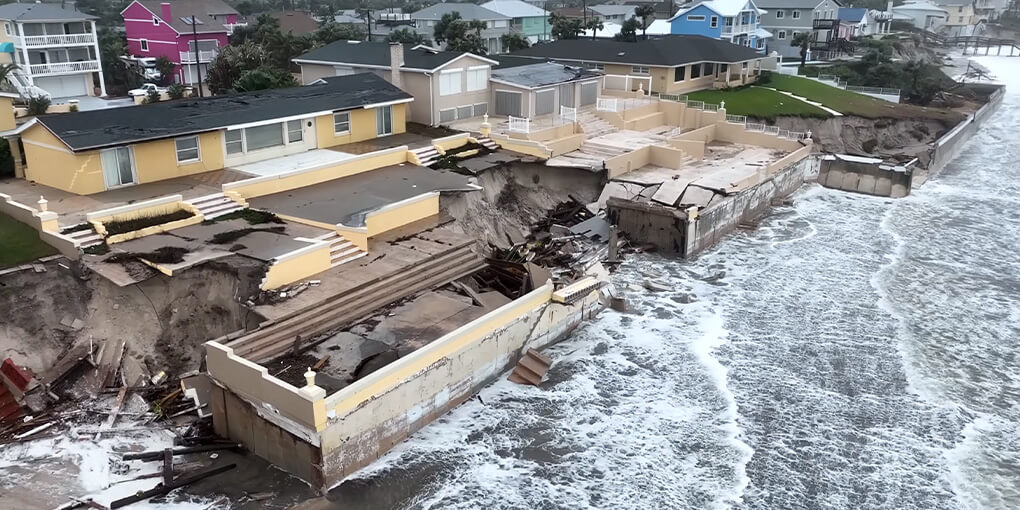
Florida’s 2023 legislative session wrapped up in early May. While there were thousands of bills filed ahead of session, less than 350 crossed the finish line. Of those, only a handful will directly and positively impact Florida’s ocean, waves and beaches. The only bill that is required to pass each session is the appropriations bill, also known as the state budget. On the plus side, while there are hundreds of millions of state dollars poised to support resiliency planning and adaptation, there was also language added to the implementing bill of the budget that extends the Hurricane Restoration Reimbursement Program for the next fiscal year, signed into law by Governor DeSantis today.
This grant program was created with the enactment of Senate Bill 4A during the December 2022 Special Session, purportedly to address recovery from the devastation of Hurricanes Ian and Nicole. The $50 million program provides $300,000 per eligible beachfront private property owner for ‘hurricane restoration’ projects which include sand placement, and temporary or permanent coastal armoring. In other words, the state is using millions of taxpayer dollars to fund the construction of seawalls on - and to protect - private property across the state in the aftermath of two natural disasters fueled by climate change. The use of public monies for private coastal armoring is unprecedented, and likely unconstitutional under state law, which prohibits the use of public funds without a public purpose.
Put simply, coastal armoring does not work. Seawalls cause beach loss directly in front of the structures, while simultaneously increasing erosion on adjacent areas that do not have armoring. Investing public dollars into seawalls will only hurt the taxpayers on either side of the armoring, devaluing their property and accelerating the impacts of sea level rise and climate change on Florida’s critically eroded sandy beaches, as well as the beachgoing public who recreate on impacted beaches.

Furthermore, the Florida Department of Environmental Protection (FDEP) acknowledges within its own policy guidance that seawalls present significant and adverse impacts to beaches. In FDEP's Coastal Armoring Policy and Guidelines document notes that coastal armoring "may negatively impact the integrity and natural functioning of the beach and dune system, and it may also increase the vulnerability of adjacent unarmored properties to storm damage." DEP further expands upon these impacts in its Homeowner's Guide to the Coastal Construction Control Line Program, "While coastal armoring provides protection to upland properties and structures from waves generated by coastal storms, seawalls and revetments adversely impact the beach and dune system. In areas of existing erosional stress, coastal armoring causes increased erosional stress on the beaches fronting the armoring and those adjacent to it. Seawalls can also interfere with marine turtle nesting activities."
At a time when the state should be harnessing its vast nature-based solutions and implementing thoughtful resiliency and adaptation strategies, including managed retreat, it is directly funding activities that stand to dismantle Florida’s coasts and thereby the economies, livelihoods and communities that depend on them.
Surfrider opposes this program and its extension and is demanding the state to terminate the Hurricane Restoration Reimbursement Program immediately. While Florida has made significant inroads insofar as climate vulnerability and adaptation planning, this program is a marked regression for the state’s resiliency, coastal management policy and hurricane recovery programs. Surfrider sent a letter to Florida’s Governor, Secretary of the Department of Environmental Protection, House Speaker and Senate President underscoring the fact that the Program’s funding of coastal armoring is an unconstitutional expenditure of public funds without serving a public purpose, and must be ended immediately.
While the legislative session may be over and this measure came to pass, Florida and its beaches will be forever impacted by the bills and budget passed by the legislature and signed by the Governor - impacts further compounded by climate change. Surfrider will continue to educate members of the Florida legislature about the harms of this program for Florida’s vulnerable coasts and advocate to reverse the Hurricane Reimbursement Restoration Program. The future of Florida’s ocean, waves and beaches depend on it.
